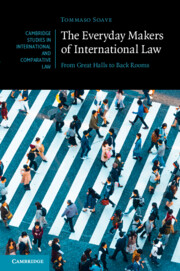Book contents
- The Everyday Makers of International Law
- Cambridge Studies in International and Comparative Law: 170
- The Everyday Makers of International Law
- Copyright page
- Dedication
- Epigraph
- Contents
- Preface
- Abbreviations
- 1 Carnegieplein 2, 10:00 am
- 2 Coffee, Cigarettes, and International Judicial Practices
- 3 A New Generation of Litigators
- 4 Telling a Story
- 5 The Invisible Army
- 6 The Three Wise Monkeys
- 7 The Lyophilization of Life
- 8 The Memo
- 9 To Capture the World
- 10 Bricolage
- 11 The Explorer
- 12 A Four-Letter Word
- 13 What Does It Mean…
- 14 The Stage
- 15 The Moment of (Constructed) Truth
- 16 Truth Woven Together
- 17 Spijkermakersstraat 9, 8:00 pm
- Index
- Cambridge Studies in International and Comparative Law
6 - The Three Wise Monkeys
Published online by Cambridge University Press: 03 November 2022
- The Everyday Makers of International Law
- Cambridge Studies in International and Comparative Law: 170
- The Everyday Makers of International Law
- Copyright page
- Dedication
- Epigraph
- Contents
- Preface
- Abbreviations
- 1 Carnegieplein 2, 10:00 am
- 2 Coffee, Cigarettes, and International Judicial Practices
- 3 A New Generation of Litigators
- 4 Telling a Story
- 5 The Invisible Army
- 6 The Three Wise Monkeys
- 7 The Lyophilization of Life
- 8 The Memo
- 9 To Capture the World
- 10 Bricolage
- 11 The Explorer
- 12 A Four-Letter Word
- 13 What Does It Mean…
- 14 The Stage
- 15 The Moment of (Constructed) Truth
- 16 Truth Woven Together
- 17 Spijkermakersstraat 9, 8:00 pm
- Index
- Cambridge Studies in International and Comparative Law
Summary
Although judicial bureaucracies are the backbone of international courts and tribunals, their presence remains largely unacknowledged in official discourse and scholarly analysis. This chapter takes collective silence as an object of interest and explores its socio-political dimensions. The role of judicial bureaucrats is an open secret. Courts, government representatives, counsel, and academics are all aware of it, and yet conspire to keep it invisible to the public. The chapter reflects on the reasons behind the conspiracy of silence. Could it be due to the confidential nature of judicial proceedings? To the need to preserve the legitimacy of judicial institutions in the eyes of their audiences? Or, perhaps, to the instinctive desire of international lawyers to maintain an aura of mystery and sanctity around their profession?
Keywords
- Type
- Chapter
- Information
- The Everyday Makers of International LawFrom Great Halls to Back Rooms, pp. 137 - 152Publisher: Cambridge University PressPrint publication year: 2022

